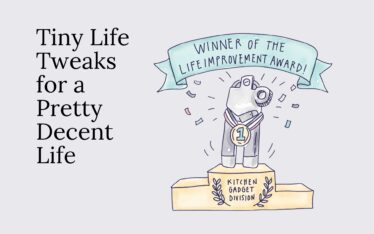I have mixed emotions about self-control, and I know you do too.
Mixed Emotion about Self-Control #1:
Self-control is code for “the fun around here is definitely going to end,” and while I might not be blonde, I do like to have more fun. I bristle at the idea of fun being contained, of fun being curtailed. If I had the energy to stay up past 9:10pm and if I was an extrovert (two things that will never be true, but work with me here), I’d be the last one at the party, avoiding the “I’ve arrived” text from the Uber driver waiting for me in the driveway.
I grew up with a manic-depressive Mom who pinned an “Are We Having Fun Yet?” button to her acid wash jacket back in the 80s. She was absolutely not having fun a lot of the time, and so I learned to value the fun times at home because they were fabulous but fleeting.
Do you also have a sense of disdain for the killjoy spirit known as self-control? Do you alternatingly resent and respect self-control for its ability to stop you at three Oreos, when you’d love to indulge in the rest of the row? Self-control is our inner responsible parent that prevents us from “too muchness” … getting too drunk, too stuffed, too sloppy, too gropy, too anything that might get us into rehab/ jail/ the doghouse/ the unremitting vortex of shame. It might burst the fun balloon, but it keeps us employed/ married/ sober/ other things that keep us happy &/or alive.
Mixed Emotion about Self-Control #2:
Self-control is code for “I can master the nooks and crannies of my life with increasing amounts of discipline.” Self-control is what keeps the wheels on the bus, and when you’re a hyper-achiever whose self-worth is defined by whether the bus gets to its destination on time, without hitting too many pedestrians on its way to the station, you’re going to maybe over-index on it. Self-control is the hyper-achiever’s badge of honor, and us achievers love badges! If controlling ourselves (our emotions, our actions, our responses, our facial expressions, our discipline with work, our bedtimes, and oh dear God our calories) means that we might win the Self-Control Bus Driver of the Year Award, it’s no wonder we morph into control freaks.
Do you also have a love/hate relationship with self-regulation? Does it represent the righteous path towards ultra-achievement for you? Does self-control awaken your inner perfectionistic giant, causing you to overdose on the very thing that’s supposed to prevent you from overdosing on things in the first place?
Right … the chocolate story

These are supposed to be Hershey’s Kisses. Stop judging my doodles.
When I was 14 I gave up chocolate—initially as an experiment to eradicate a blemish I woke up with on Easter morning. (Most of us would agree that that was a noble mission for a vain teenage girl with a sweet tooth.) My hiatus turned into a month (those poor Cadbury Creme Eggs went uneaten that Easter—it’s a travesty, I know), and the month turned into several months which then turned into all of my 20s and most of my 30s.
People wondered how I could do it, how I could give up one of the very best reasons for living, how I possessed so very much self-control. The truth was it was easier to not have chocolate be on my menu of options than to try and eat it in moderation. It would have taken enormous amounts of control to eat just one Coffee Crisp bar a week (you Canadians feel me) than to just say no to anything and everything enrobed in chocolate.
So I quit something I loved because I couldn’t control myself otherwise. And in a world that’s uncontrollable, we sometimes cling to the little things we can influence, don’t we? It’s not a coincidence that my parents had recently divorced when I said sayonara to chocolate (don’t worry Dad—I promise you didn’t wreck my life!); I was trying to get a better grip on the steering wheel of the bus.
Grasping at the straws of control
Some of us try to control what we eat to feel like we’re masters of our domain. Some of us fastidiously organize our work and calendars and desk drawers to feel like life’s more manageable than it really is. Some of us work out a tad obsessively to feel a semblance of command that goes beyond our ability to do pullups. Some of us worry excessively about things that could go wrong into the future, so we feel like we’re somehow in control of our actions and the 475 possible outcomes. Some of us try to control other people (one of my clients knows she bosses her kids and husband around because she feels untethered at work).
It’s reassuringly normal to want to be in control of things in our lives … cue psychologist Carol Ryff’s Six-factor Model of Psychological Well-being that highlights the importance of effectively mastering our life and surrounding world, and having a sense of autonomy/ self-determination in our days (two of the six ingredients for well-being in said model). But it’s possible to be out of control with our desire to be in control (control2?!), and then we end up diminishing our lives … like forgoing chocolate for 25 long, Snickers-free years.
Is there a sweet spot for self-control that’s actually good for our well-being?
Self-regulation is one of the 24-character strengths in the robustly researched VIA Character Strengths assessment (which I insist you take for free online here, but not until you’re done this article).
Psychologists are downright giddy about self-regulation: “Self-control allows people to override responses that hinder happiness or health, and further, to substitute or develop more adaptive responses. Self-control is a vital psychological strength that is crucial to personal well-being and, accordingly, should be amply cultivated in fostered.”
These researchers love self-regulation so much that they go on to say that “(it is) our belief that there is no true disadvantage of having too much self-control. The extant psychological findings, as well as direct empirical tests, give no indication that problems can arise from having self-control.” (Maybe they need to study people who quit chocolate for 25 years?)
Other useful “news we can use” on self-control:
- Our capacity for self-regulation depletes as we use it, which explains why evening is THE FRIGGING WORST for controlling whatever we want to stay in control of (our eating/ gambling/ drinking/ porn/ shopping/ smoking/ whatever we’re trying hard to restrain ourselves from) … because we’ve been holding off all damned day and by 8pm we’ve lost our willpower and just want to melt into comfort.
- Our capacity for self-regulation appears to grow stronger through regular use, like how we can bench press more and more weight as we work our pecs out (not that I’ve done that in years). So there’s hope! Our self-control might deplete as we tax it, but our starting point can become pretty darned impressive through practice.
- Researchers share that people with high self-control apparently make better relationship partners (refraining from cheating is apparently a real marriage booster!) and get along better with other people.
- Leaders with high self-control scores are rated by their team members as fairer, more trustworthy, and more consistent than leaders who lose their shit around the office.
- Kids with higher self-control are found to be more popular, and when kids delay gratification at the age of four, they’re found to be more academically and socially successful a full decade later. (So my chocolate hiatus might make me astronomically successful?)
 Oh … the chocolate story. I almost forgot to wrap it up. After two and a half decades of deprivation (and a not-insignificant amount of therapy—more hilarious eating disorder stories on the horizon!), I knew it was time to reintroduce the joys of chocolate back into my existence. I hemmed and hawed for months: how to do it in a memorable, meaningful way? How to not just have a Mounds bar on a random unceremonious Wednesday? (Although I am a fan of randomness, like when Paul Giamatti’s character in Sideways drank his beloved 1961 Chateau Cheval Blanc at the burger joint … remember that?)
Oh … the chocolate story. I almost forgot to wrap it up. After two and a half decades of deprivation (and a not-insignificant amount of therapy—more hilarious eating disorder stories on the horizon!), I knew it was time to reintroduce the joys of chocolate back into my existence. I hemmed and hawed for months: how to do it in a memorable, meaningful way? How to not just have a Mounds bar on a random unceremonious Wednesday? (Although I am a fan of randomness, like when Paul Giamatti’s character in Sideways drank his beloved 1961 Chateau Cheval Blanc at the burger joint … remember that?)
The Husband and I were planning a trip to the Grand Canyon, and we nodded in solemn agreement. I was going to eat chocolate fudge (from the best fudge store in Sedona) and eat it in a helicopter over the canyon (despite the “no food or drink” sign). If we were going to crash, at least I’d die happy with a face full of rocky road fudge. Good news! We didn’t perish, and in the many years since then I’ve made up for the 25 years I went without chocolate.
Life is better when we do the tough work of regulating what’s good and bad for us in moderation. Extremes limit our capacity for joy. Let’s build our self-control like the muscle it is, and let’s not get deluded into thinking it’ll either burst the fun bubble forever or help us become obsessive perfectionistas. What’s on the menu for me right now? Reece’s Peanut Butter Cups. What’s your chocolate fix of choice?

P.S.: Want to connect on Instagram? Me too.
P.P.S.: Oh and just in case you missed it… I’d love you forever if you took 16 minutes out of your life to watch my TEDx talk!






